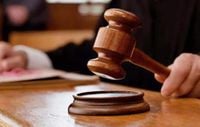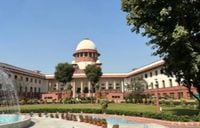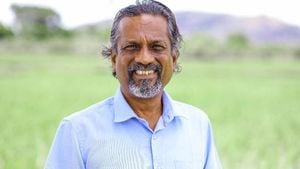The Supreme Court of India has recently intervened in a significant legal matter involving the acceptance of an apology from two advocates accused of contempt of court. This case, which has sparked considerable debate within the legal community, revolves around a Special Leave Petition (SLP) filed by petitioner N. Eswaranathan, alongside his legal representatives, AOR P Soma Sundaram and Advocate S. Muthukrishnan. The two-Judge Bench, comprising Justice Bela M. Trivedi and Justice Satish Chandra Sharma, expressed divergent opinions regarding the advocates' apology, ultimately deciding to refer the matter to the Chief Justice of India (CJI) for further consideration.
On April 18, 2025, the Supreme Court placed the issue before the CJI after the Bench could not reach a consensus. Justice Trivedi voiced her reservations about accepting the advocates' apology, suggesting that it stemmed from a misuse of the court's processes. She stated that the advocates, who are expected to uphold the integrity of the legal profession, had engaged in unethical practices by filing a vexatious petition that distracted from the administration of justice. "The advocates who were supposed to be the Officers of the Court and the Champions for the cause of justice sometimes indulge themselves into a kind of unethical and unfair practices," she remarked.
Conversely, Justice Sharma argued that the apology expressed by the advocates was genuine and should be accepted. He noted that both advocates had shown remorse and promised not to repeat their misconduct in the future. Several prominent figures from the Supreme Court Bar Association (SCBA) and the Supreme Court Advocates-on-Record Association (SCAORA) had appealed for leniency, which Justice Sharma felt should not be disregarded. He emphasized that suspending an Advocate-on-Record (AOR) for a month could have lasting negative consequences on their career.
The contrasting views of the two judges highlight the ongoing tensions within the legal community regarding accountability and the standards expected of legal practitioners. This case has drawn attention not only for its implications for the involved advocates but also for its broader impact on the legal profession in India.
In a separate but equally significant development, Vice President Jagdeep Dhankhar's recent remarks about the Supreme Court's directive concerning the President's timeframe for acting on bills have ignited a wave of responses from legal experts. The Supreme Court had mandated that the President must decide on bills reserved under Article 201 within three months, while Governors should act within a month on state assembly-passed bills. This ruling was made in response to concerns over delays in the legislative process, particularly highlighted by a bill pending since January 2020.
Legal experts have expressed mixed views on the Vice President's criticism of the Supreme Court's directive. Senior Advocate and SCBA President Kapil Sibal defended the judiciary's right to intervene when the executive fails in its duties, asserting that such interventions are essential for upholding democracy. He criticized the Vice President's remarks, stating, "I have never seen such political statements from a House chairman," and emphasized that questioning the Supreme Court's directive is inappropriate since the President acts solely on the advice of the Council of Ministers.
Former Additional Solicitor General Aman Lekhi echoed Sibal's sentiments, arguing that the judiciary should not be seen as an extension of the government. He described the Vice President's comments as hyperbolic and cautioned against stirring public emotions surrounding legal issues, which could lead to misconceptions about the judicial system.
Former Union Law Secretary PK Malhotra highlighted the extraordinary powers granted to the Supreme Court under Articles 32, 136, and 142, which are intended for enforcing fundamental rights and ensuring justice. He noted that while these powers are crucial, they should be exercised judiciously and not excessively, as seen in previous cases.
Pinki Anand, another former ASG and Senior Advocate, criticized the Supreme Court's imposition of strict timelines for the Governor and President in relation to Articles 200 and 201. She argued that interpreting "as soon as possible" too rigidly constitutes judicial overreach, as the Constitution's framers deliberately left the phrase open-ended to accommodate governance complexities.
Sumit Gehlot from Fidelegal Advocates & Solicitors weighed in, stating that the Supreme Court's ruling aimed to ensure that constitutional functionaries act within reasonable timeframes. He found the Vice President's characterization of the court's actions as a "nuclear missile against democratic forces" to be inappropriate, asserting that the ruling does not undermine democracy.
In another notable case, the Supreme Court quashed a Delhi High Court order requiring Wikimedia to take down a Wikipedia page following a defamation claim by Asian News International (ANI). The High Court had ruled that the statements on the page were defamatory and not verbatim reproductions of the referenced texts. However, the Supreme Court disagreed with this reasoning, stating that the takedown order was overly broad and directed the news agency to specify which content should be removed.
The Supreme Court's decision underscores the importance of maintaining a balance between protecting reputations and ensuring the free flow of information. Wikipedia, a community-driven platform, hosts over 62.95 million articles in more than 350 languages, and its model relies on user-generated content. The Court's ruling emphasizes the need for careful consideration before imposing takedown orders that could stifle open discussion and access to information.
These recent developments reflect ongoing tensions within India's legal landscape, highlighting the delicate balance between judicial authority, executive action, and the rights of individuals and organizations. As the legal community grapples with these issues, the outcomes of these cases will undoubtedly shape the future of law and governance in India.






